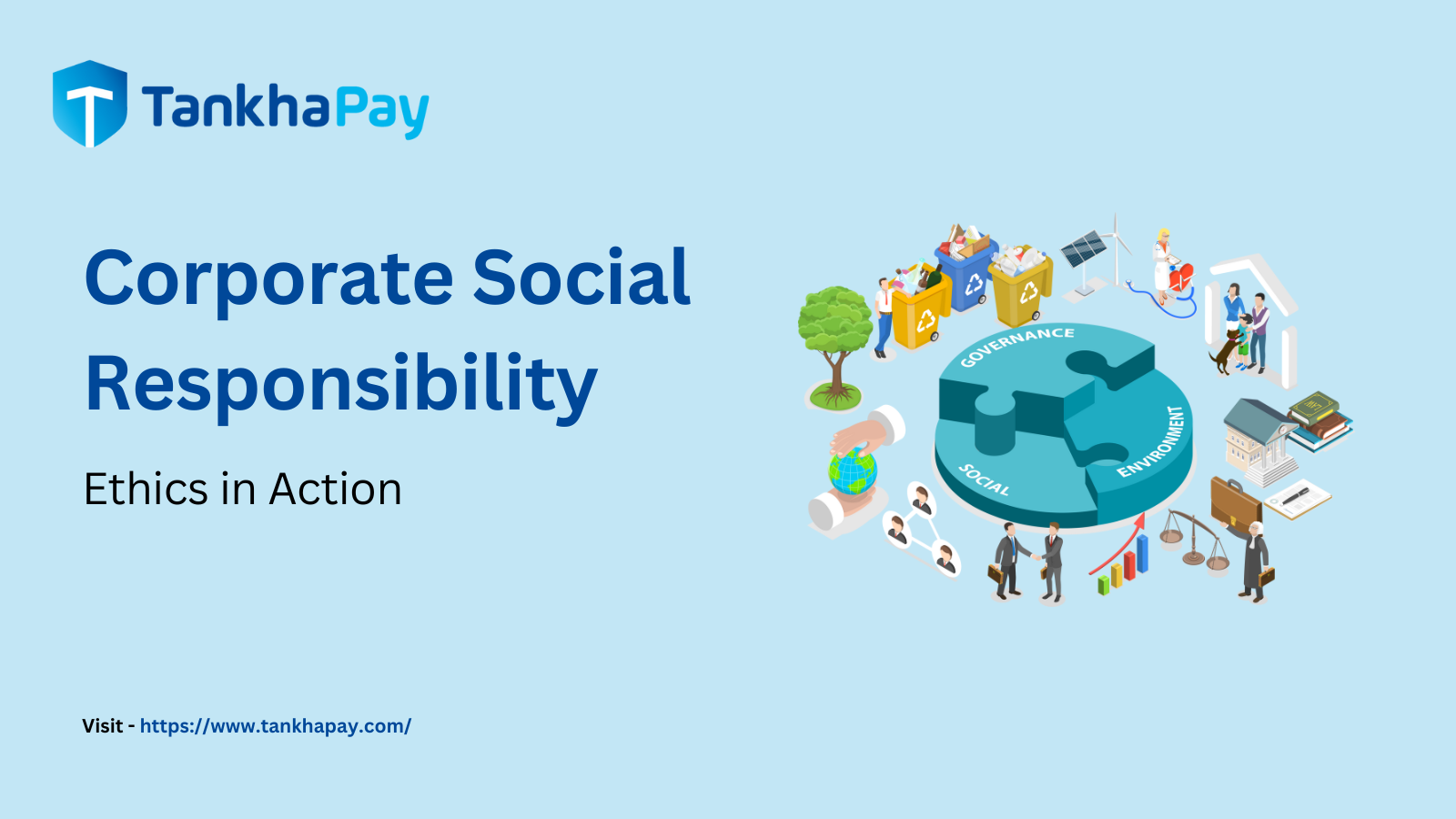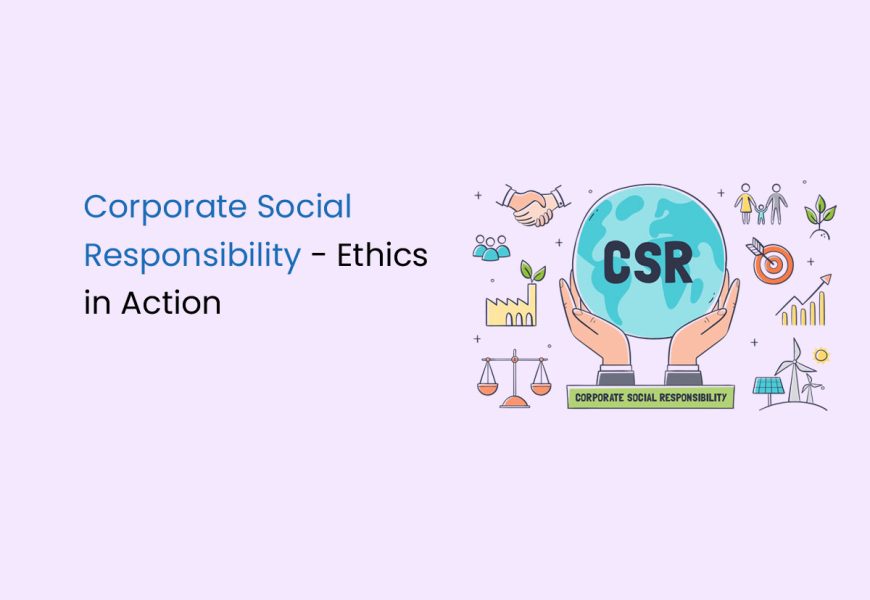
Modern businesses are under growing pressure for greater accountability over the impact their activities have on society and the environment. CSR, therefore, has graduated from a business practice considered respectable to a consumer expectation.
CSR encompasses the business model and the level of responsibility that companies should uphold to impact the world positively. This model delineates how a company can be responsible to itself, its employees, stakeholders, the public, and the environment.
Corporate Social Responsibility, which was once considered non-core, has become a norm. Sustainability not only appeals to a generation of consumers but rather favors businesses that have adapted to include CSR in business models. Consumer preference reinforces CSR’s role in reinforcing and creating value for any brand.
What is Corporate Social Responsibility?
Corporate Social Responsibility is the management concept whereby businesses absorb social and environmental issues in their activities and interactions with stakeholders. CSR has a significant value to be assisted toward companies for them to meet economy, environment, and societal claims as well as shareholder expectation and stakeholder needs. Distinguishing CSR from philanthropy, Sponsorships and charity CSR is essential, which is strategic business management instead of philanthropy; it can surpass corporate improvement. Charity and sponsorships are often connected with improving the position or a brand as poverty relief is connected but CSR contains other obligation too.
Importance of Corporate Social Responsibility

Here is the importance of corporate social responsibility:
- Building Trust and Reputation: In recent years, consumers are more likely to be careful about the ethical behavior of businesses that they support; hence CSR is very essential in gaining confidence and maintaining their reputation. Organizations that can show actual commitment to the social and environmental causes are well-placed to gain consumers’ confidence, which is reflected in increased brand loyalty and recommendations.
- Attracting and Retaining Talent: Employees seek something more than just pay. They desire to work for organizations and with companies that are positive for society. A good CSR program can help attract the best talent and create a sense of pride for their company.
- Risk Management: CSR programs are necessary for companies to mitigate and decrease risks, including regulatory and reputational ones. Companies that operate with integrity and with sustainable practices may avoid legal matters as well as negative press due to unethical practices or ecological harm.
- Driving Innovation: Corporate Social Responsibility (CSR) is the driving force behind organizational innovation. CSR promotes new product and service lines that address social and environmental problems, so creating a new market and enhancing an organization’s competitive edge within it.
Benefits of Corporate Social Responsibility
Some benefits of corporate social responsibility include:
- Improves Brand Reputation: CSR contributes to building and maintaining a good corporate reputation and brand equity. Companies that prioritize social and environmental efforts are generally perceived as more trustworthy and ethical by the public. This positive perception enhances the brand’s visibility and credibility among consumers, investors, and other stakeholders.
- Enhanced Customer Loyalty: In fact, research has shown that people are increasingly devoted to firms they believe are socially responsible. Corporate social responsibility measures increase client interactions, resulting in higher retention and satisfaction levels.
- Increased Investor Attraction: Changes in investment practices are resulting in investors placing more emphasis on ESG factors when deciding on investment opportunities. Strong CSR policies in firms attract conscious investors seeking to connect their investments with their ideals.
- Reduced Regulatory Burden: Good corporate social responsibility practices can help the company develop better relationships with regulators. Companies that maintain very high ethical standards and involve themselves in social and environmental initiatives can gain the trust and good will of regulators. Consequently, this can lead to a lighter regulatory load; companies that demonstrate compliance and sound ethics are less likely to suffer intense regulatory scrutiny and sanctions.
- Positive Social Impact: Corporate social responsibility projects benefit businesses and impact society positively. Companies can contribute a lot to their immediate societies and the world at large by donating to charities, volunteering, or simply doing environmentally friendly practices.
Integrating CSR into Business Strategies
Here are some ways that corporate social responsibility can be integrated into business strategies:
- Aligning with Core Values: For CSR initiatives to have a meaningful impact, they must be closely integrated with the company’s fundamental beliefs and mission. This integration ensures that CSR becomes an intrinsic aspect of the company’s identity and day-to-day activities rather than being just an add-on.
- Setting Clear Goals: Businesses need to establish specific and quantifiable objectives for their corporate social responsibility endeavours. By doing so, they can monitor their advancement and showcase the outcomes of their endeavours to their stakeholders.
- Engaging stakeholders: It is one of the best ways to ensure that CSR programs are implemented successfully. Stakeholders include employees, customers, suppliers, and the community. They require effective communication, consultation for inputs, and meaningful collaborations.
- Reporting and Transparency: Companies should remain transparent to build trust and credibility. They should continue to report comprehensive details regarding their CSR initiatives and performance so that the stakeholders are able to really understand their efforts and outputs.
Corporate Social Responsibility Examples
Here are some corporate social responsibility examples:
Patagonia
Patagonia is a renowned outdoor apparel firm known for its commitment to environmental sustainability. The CSR initiatives of this company include:
- Patagonia dedicates 1% of its sales to environmental non-profits. This has translated into millions of dollars for conservation efforts around the world.
- Worn Wear Program: Patagonia encourages customers to repair, reuse, and recycle their clothing. The company offers repair services and even store credit for used items in good condition.
- The brand uses eco-friendly materials, including organic cotton, recycled polyester, and wool. It also is based on fair trade standards to ensure that the people working in the supply chain are fairly paid and safe working conditions.
Unilever
The Unilever Sustainable Living Plan is a goal for decoupling the company’s growth from its environmental footprint, with a corresponding boost to positive social impact. The main points include:
- Unilever, through its brands, seeks to enhance the health and well-being of over a billion people through improved access to hygiene, sanitation, and nutrition.
- The company is working to cut the environmental impact of its products by half by 2030, focusing on greenhouses gases, water, and waste.
- Unilever will strive to improve the livelihoods of millions of people in its value chain-smallholder farmers and women entrepreneurs alike.
Starbucks
Starbucks has begun working on several CSR programs primarily in the areas of ethics sourcing, community, and environmental sustainability. Starbucks had initiated the following projects;
- The Coffee and Farmer Equity (C.A.F.E.) program ensures that Starbucks gets its coffee ethically focused on high-quality standards and standards of social responsibility and leadership regarding the environment.
- Starbucks has launched Community Stores that give back to local nonprofit organizations by donating some of its profits. These also act as community centers for the locality, where several events and activities are undertaken to engage the local people.
- It is dedicated to building and operating stores that meet severe environmental standards. It will be creating 10,000 Greener Stores around the globe by 2025.
Microsoft
Microsoft’s CSR practices focus on using technology as a tool to solve global problems. They have initiated the following:
- The AI for Good program of Microsoft is a program supporting projects using artificial intelligence in the fight against societal issues like healthcare, accessibility, and environmental sustainability.
- Microsoft has been carbon-neutral since 2012. It has also made a commitment to becoming carbon-negative by 2030. Investments are being made in renewable energy, sustainable product design, and carbon capture technologies.
- Microsoft is working to bring affordable internet access to underserved communities worldwide through initiatives like the Affordable Access Initiative and the Airband Initiative.
IKEA
IKEA’s CSR efforts are focused on sustainability, social impact, and community development. They have initiated the following:
- IKEA’s sustainability strategy focuses on positively impacting the planet by promoting renewable energy, sustainable sourcing, and waste reduction. IKEA aims to become climate-positive by 2030.
- The company is one of the founding members of the Better Cotton Initiative, which promotes sustainable cotton farming practices that reduce environmental impact and improve working conditions for farmers.
- IKEA has launched several initiatives to support refugees, including employment programs and partnerships with organizations like the United Nations High Commissioner for Refugees (UNHCR) to provide job training and opportunities.
Coca-Cola
Coca-Cola’s CSR initiatives are environmental sustainability and community empowerment. They have initiated the following:
- Coca-Cola has set its goal to replace 100% of the water used in its beverages and manufacturing processes. The company has undertaken many water-saving initiatives globally, such as watershed protection, rainwater harvesting, and wastewater treatment.
- The 5by20 Initiative is a program that aims to empower 5 million women entrepreneurs across Coca-Cola’s value chain by 2020. The program provides women with business skills training, financial services, and mentorship.
- Coca-Cola is committed to packaging 100% recyclable by 2025 and also uses at least 50% of recycled material in its packaging by 2030. The company also supports global recycling efforts and waste reduction initiatives.
Read Also – How HRIS Can Transform the Employee Lifecycle Experience







